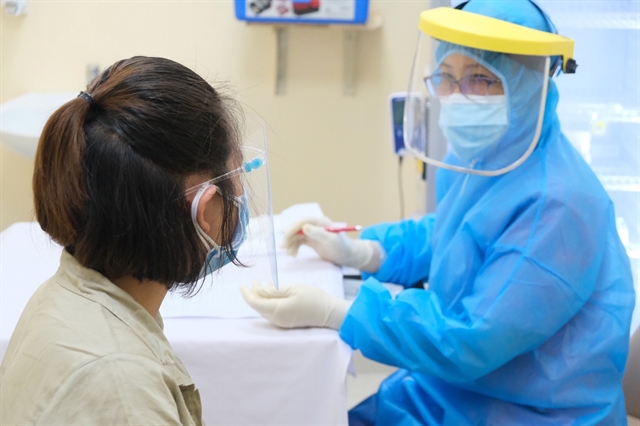.jfif) Opinion
Opinion

Doctor Trần Danh Cường, director of the National Hospital of Obstetrics and Gynecology talked to Sức khỏe & Đời sống (Health & Life) newspaper about COVID-19 vaccinations for women who are pregnant or breastfeeding

|
| A doctor at Hùng Vương Hospital gives COVID-19 vaccine advice to an expecting mother in HCM City. — VNA/VNS Photo |
Doctor Trần Danh Cường, director of the National Hospital of Obstetrics and Gynecology talked to Sức khỏe & Đời sống (Health & Life) newspaper about COVID-19 vaccinations for women who are pregnant or breastfeeding
Is COVID-19 dangerous to pregnant women? Do they face more risk of catching it than others?
Studies conducted all over the world show that pregnant women face the same risk of catching SARS-CoV-2 as other people.
However, once catching the virus, pregnant women are vulnerable because, during pregnancy, a woman's immune system can be weakened.
During pregnancy the pregnant woman's uterus will be larger, pushing the diaphragm up and making the lung capacity low, which obstructs their breathing. So, the oxygen demand of pregnant women is higher than that of normal people.
As pregnancy progresses, fluid may accumulate in tissues, usually in the feet, ankles, and legs, causing them to swell and appear puffy. This condition is called edema. The edema is also seen in the upper respiratory tract mucosa, which easily causes damage to the upper respiratory tract. If infected with COVID-19, the pregnant women are more at risk.
Underlying health conditions like high blood pressure, diabetes, heart disease, obesity, chronic lung disease will also cause complications during pregnancy.
Together with the above factors, if pregnant women get COVID-19, they will face a high risk of serious complications which require intensive care, ventilators and ECMO.
Vaccinating pregnant women against COVID-19 is very important.
Is the COVID-19 vaccination safe for pregnant women?
When a pregnant woman catches SARS-CoV-2, two of the most common issues are if the virus goes to the fetus and if the unborn child catches COVID-19.
When we tested amniotic fluid samples from pregnant women after giving birth, blood samples from the umbilical vein and throat fluid samples from the mother and the pathology of the placenta, scientists did not detect any SARS-CoV-2 virus in the samples.
This confirms that the SARS-CoV-2 virus did not enter the amniotic cavity where the baby grows.
Normally, in the first 12 weeks of pregnancy, the exchange between the mother and the fetus is modest, so the risk of transmitting of SARS-CoV-2 virus from mother to child is very low.
However, if an infection occurs at this stage, the risk to the baby is great and can potentially cause abnormalities in the fetus because this is the period of formation and development of the important organs of the fetus.
In the next stage, the possibility of infection between mother and child is very strong, but the risk of causing birth defects is lower because important organs of the fetus have already formed.
According to the latest COVID-19 vaccination guidelines of Việt Nam’s health ministry, pregnant women at 13 weeks and more can get COVID-19 vaccines. The vaccination for the mothers will help produce antibodies against the COVID-19, their babies may benefit from vaccine antibodies that pass through the placenta.
I think that the ministry’s guideline is reasonable using scientific proof ensuring safety for both mothers and their children. The benefits of the vaccination are much more when compared with the risks it might bring.
If the COVID-19 vaccination is taken by breastfeeding mothers, will it affect their babies?
Studies show that the SARS-CoV-2 virus does not spread through breastfeeding. So, if having the COVID-19, breastfeeding mothers still can breastfeed their babies as long as they strictly take anti-infection measures.
What should pregnant or breastfeeding women do before and after they get COVID-19 vaccines?
The COVID-19 vaccination for pregnant women is necessary to protect them from the SARS-CoV-2.
Before getting a COVID-19 vaccine shot, pregnant women need a medical check to identify the health conditions of them and their babies.
Pregnant women with underlying health conditions need more careful medical checks. I think that only those with risks of preeclampsia, placental abruption and other serious obstetric complications should delay the COVID-19 vaccination.
As a medical facility assigned by the Ministry of Health to take care of and protect the health of pregnant and postpartum women, my hospital has prepared all necessary elements to vaccinate pregnant women after 13 weeks and breastfeeding mothers. VNS




